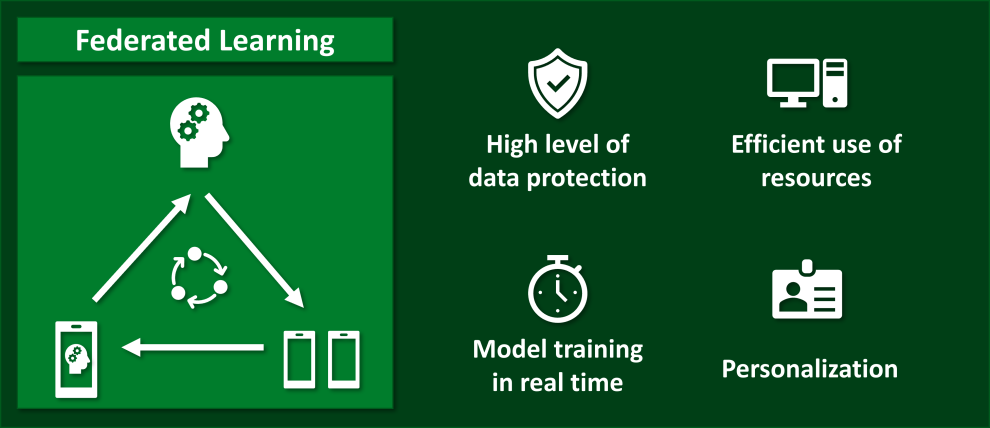In today’s data-driven world, Artificial Intelligence (AI) powers innovation across industries. However, realizing the full potential of AI often requires collaboration to access diverse datasets – a challenge for competitors hesitant to share sensitive data.
This is where Federated Learning (FL) emerges as a game-changer. Enabling collaborative model development without compromising privacy, FL allows participants to improve global models by exchanging only encrypted updates instead of raw data.
This article explores how purpose-built distributed AI frameworks make secure and incentivized federated learning possible for rivals, unlocking innovation, reducing costs, and accelerating the development of robust AI solutions.
The Dilemma of Data Silos Between Competitors
Traditional centralized AI approaches require aggregating data into large datasets for model training. However, for competitors, sharing sensitive data raises significant concerns:
- Loss of control and ownership over proprietary data
- Privacy violations and data breaches
- Relinquishing competitive advantage
As a result, rivals often choose to develop AI solutions within isolated data silos. But this severely limits model robustness, generalizability, and ultimately innovation.
Federated Learning: Decentralized Training with Privacy Protection
Federated Learning provides a middle ground – enabling collaborative model improvement without requiring central data storage or transfer of raw data between participants. This is achieved through:
- Decentralized on-device training: Models are trained locally using participant’s own datasets
- Secure aggregation of updates: Only model updates like gradients or parameters are shared, not the underlying data
- Encryption and privacy enhancement techniques: Ensuring updates reveal minimal information about individual data points
Together, these mechanisms allow participants to leverage collective data diversity for better models while maintaining data sovereignty and confidentiality.
Challenges in Deploying Federated Learning for Rivals
While promising, effectively implementing federated learning in competitive environments introduces new challenges including:
- Incentive misalignments: Competitors may refrain from contributing without mechanisms ensuring fairness and shared value
- Heterogeneous formats: Inconsistent data distributions or modalities can impede model convergence
- Security and compliance risks: Malicious participants could steal information or manipulate learning
Overcoming these challenges requires purpose-built frameworks with specialized algorithms, encryption, access control, verification capabilities and incentive mechanisms tailored for multi-party competitive contexts.
Introducing Distributed AI Frameworks Enabling Secure Federated Learning
Emerging distributed AI frameworks now provide customizable environments to facilitate privacy-preserving federated learning specifically among rivals or regulated entities. Let’s explore some leading platforms.
TensorFlow Federated (TFF)
An open-source framework from Google providing modular libraries for federated computation on decentralized data. Key features include:
- Integration of differential privacy, secure aggregation, and encryption
- Flexible scheduling and weighting strategies for heterogeneous data
- Support for multiple hardware platforms like mobile, embedded devices, and servers
PySyft and the Federated Learning Ecosystem
A Python library built by OpenMined enabling FL applications on a wide range of devices and frameworks via convenient abstractions. Enables development of systems like:
- SyferText: privacy-preserving NLP pipelines leveraging FL
- Grid: infrastructure for blockchain-based decentralized model training
- FedReID: decentralized training of computer vision models
PaddlePaddle Enterprise (Enterprise Paddle)
An enterprise platform from Baidu providing capabilities to meet large-scale FL deployment needs including:
- Hybridcloud support: integrates proprietary and public clouds
- Rigorous access controls and sandboxing mechanisms
- Security compliance with regulations like GDPR
Key Components for Secure and Productive Federated Learning
To enable secure and productive FL between competitors, distributed AI frameworks incorporate various specialized components:
State-of-the-art Encryption Standards
Protocols like homomorphic encryption, secret sharing, and secure multiparty computation allow transmitting encrypted model updates to prevent information leakage.
Carefully Crafted Incentives and Rewards
Mechanisms based on game theory, auctions, and blockchain provide incentives for participants to actively contribute high-quality local updates throughout the training process.
Bias Mitigation Techniques
Employing bias mitigators and adversarial training curbs the outsized impact any single participant’s data might impose on the jointly trained model.
Verification and Audit Trails
Trusted execution environments, zero-knowledge proofs, consistency checks, and immutable logs enable auditing learning processes to detect and prevent manipulation.
Realizing the Potential: When to Adopt Federated Learning
While hype abounds, FL provides maximum value under select conditions:
- Participants have intrinsically sensitive and complementary datasets
- Centralizing data is unfeasible or incurs losses that offset gains
- Outweighs alternative approaches like licensing external data or synthetic data generation
Scenarios meeting these criteria range from pharmaceutical firms jointly analyzing molecular interactions to mobile carriers optimizing next-generation personalized recommendation models.
The Future Looks Federated: In Closing
As distributed AI frameworks continue advancing, secure and mutually beneficial federated learning arrangements offer a compelling path for rivals to accelerate innovation in our data-driven economy. Concrete implementations are already emerging across industries as players recognize the efficiencies of collaboration while Distributed Learning Addresses the dilemma of isolated data silos.
With thoughtful incentive design and integrity verification measures, frameworks like TFF, Syft, and Enterprise Paddle can now make federated learning’s promise of unlocking collective intelligence into reality – it’s an exciting time for turning competition into cooperation!
















Add Comment